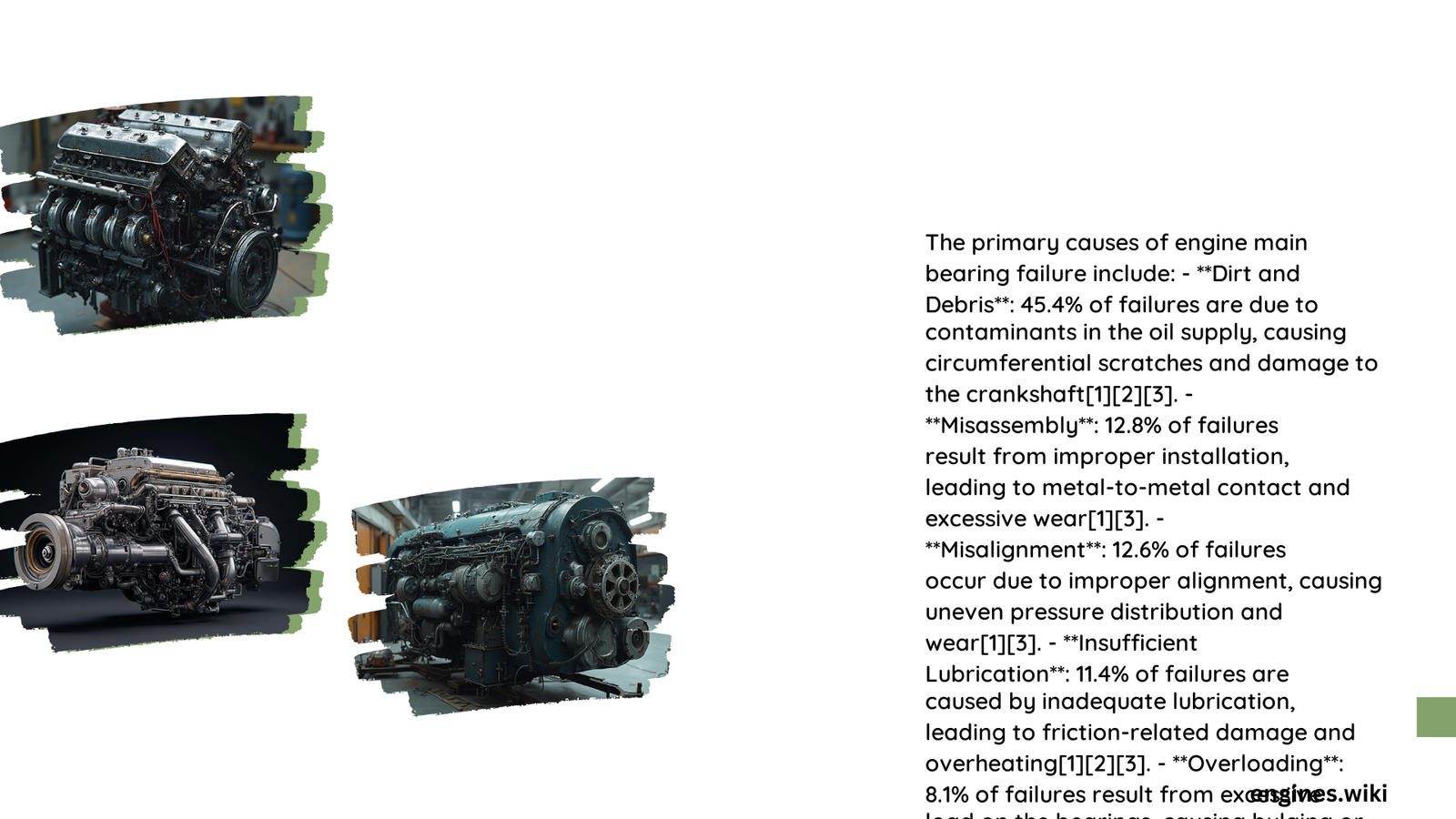Engine main bearing failure can result from various factors, including oil contamination, insufficient lubrication, improper installation, and overheating. These issues can lead to increased friction, wear, and eventual breakdown of the bearing material. Understanding these causes is crucial for maintaining engine health and preventing costly repairs. This guide explores the primary reasons behind main bearing failure and provides insights into prevention and early detection.
What Are the Primary Causes of Engine Main Bearing Failure?
Engine main bearing failure can be attributed to several key factors:
- Oil contamination
- Insufficient lubrication
- Improper installation
- Overheating
- Excessive wear and tear
Let’s delve deeper into each of these causes to understand their impact on engine bearings.
How Does Oil Contamination Affect Engine Main Bearings?
Oil contamination is a significant contributor to engine main bearing failure. Contaminants can enter the engine oil through various means and cause substantial damage to the bearings. Here are the primary types of contaminants and their sources:
- Dirt and Dust: These particles can enter through faulty air filtration systems or the air intake manifold.
- Fuel: Fuel contamination can occur due to worn engine parts or faulty fuel system components.
- Coolant: Coolant leaks can wash away the lubricating film and cause corrosion.
- Metal Particles: Worn engine components can introduce metal particles into the oil.
| Contaminant | Source | Effect on Bearings |
|---|---|---|
| Dirt/Dust | Air intake, faulty filters | Scratches, grooves |
| Fuel | Worn parts, faulty systems | Altered lubrication |
| Coolant | Leaks in cooling system | Corrosion, loss of lubrication |
| Metal Particles | Worn engine components | Increased wear, scoring |
The presence of these contaminants can lead to:
- Disruption of the protective oil film
- Increased friction and wear
- Scoring of bearing surfaces
- Reduced lubrication efficiency
What Role Does Insufficient Lubrication Play in Bearing Failure?
Insufficient lubrication is another critical factor in engine main bearing failure. Proper lubrication is essential for maintaining the oil film between the crankshaft and the bearing surface. When lubrication is inadequate, several issues can arise:
- Lack of Oil Pressure: Insufficient oil pressure can lead to metal-to-metal contact between the bearing and crankshaft.
- Incorrect Oil Viscosity: Using oil with the wrong viscosity can result in inadequate lubrication, especially under varying temperature conditions.
- Infrequent Oil Changes: Neglecting regular oil changes can lead to degraded lubricant properties and increased contamination.
To prevent lubrication-related bearing failures:
- Maintain proper oil pressure as per manufacturer specifications
- Use the correct oil viscosity for your engine
- Adhere to recommended oil change intervals
- Regularly replace oil and air filters
How Can Improper Installation Lead to Main Bearing Failure?
Improper installation of engine main bearings can significantly contribute to their premature failure. Common installation errors include:
- Incorrect Torquing: Over-tightening or under-tightening bearing caps can lead to uneven load distribution and accelerated wear.
- Misalignment: Improper alignment of bearing shells can cause uneven wear and increased friction.
- Contamination During Installation: Introducing dirt or debris during the installation process can immediately compromise bearing integrity.
- Wrong Bearing Size: Using bearings of incorrect size can result in improper clearances and oil film thickness.
To ensure proper installation:
- Follow manufacturer torque specifications precisely
- Use clean tools and work in a clean environment
- Verify bearing sizes and clearances before installation
- Ensure proper alignment of all components
What Are the Effects of Overheating on Engine Main Bearings?
Overheating can have severe consequences for engine main bearings. High temperatures can lead to:
- Degradation of lubricant properties
- Softening of bearing material
- Increased wear rates
- Deformation of bearing shells
Factors contributing to bearing overheating include:
- Cooling System Issues: Inefficient cooling can lead to overall engine temperature increases.
- Excessive Engine Load: Prolonged high-load conditions can generate more heat than the system can dissipate.
- Oil Starvation: Lack of proper lubrication can cause localized heating at the bearing surface.
- Contaminated Oil: Contaminated oil may not effectively transfer heat away from the bearings.
To prevent overheating-related bearing failures:
- Maintain the cooling system regularly
- Monitor engine temperatures during operation
- Ensure proper oil levels and quality
- Avoid prolonged high-load conditions without adequate cooling
How to Identify Early Signs of Engine Main Bearing Failure?
Detecting early signs of main bearing failure can help prevent catastrophic engine damage. Look out for these indicators:
- Unusual Engine Noises: Knocking or ticking sounds, especially during startup or under load
- Oil Pressure Changes: Sudden drops in oil pressure can indicate bearing wear
- Metal Particles in Oil: Presence of metal in oil during changes or analysis
- Increased Oil Consumption: Excessive oil consumption may indicate bearing issues
- Vibrations: Unusual engine vibrations, particularly at idle or under load
Regular engine inspections and oil analysis can help identify these signs early. If you notice any of these symptoms, it’s crucial to have your engine inspected by a professional mechanic promptly.
By understanding the causes of engine main bearing failure and implementing proper maintenance practices, you can significantly extend the life of your engine and avoid costly repairs. Regular oil changes, proper installation techniques, and attention to early warning signs are key to maintaining healthy engine bearings.
References:

